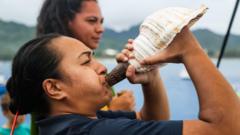In the Cook Islands, a nation comprised of 15 volcanic islands in the Pacific, the allure of seabed mining has sparked intense debate. As the world increasingly relies on batteries for electric vehicles and renewable energy sources, polymetallic nodules, rich in cobalt, nickel, and manganese, are in high demand. Jean Mason, curator of the Cook Islands Library and Museum, humorously likens these nodules to "chocolate truffles," but warns of their potential consequences for the environment.
With rising sea levels threatening their existence due to climate change, Cook Islands officials, led by Prime Minister Mark Brown, see mining as a means to secure economic independence. They estimate approximately 12 billion wet tonnes of nodules lie within their territorial waters, presenting a chance to enhance the local economy that predominantly relies on tourism. However, critics stress that the long-term impacts of deep-sea mining on marine ecosystems remain largely unknown.
The Cook Islands has issued exploration licenses to several companies, emphasizing a proposed balance between economic need and environmental stewardship. Some like Hans Smit, head of Moana Minerals, argue that every industry involves certain risks. They contend that the revenue generated could significantly benefit the islanders, particularly in securing better education and healthcare.
Opposition voices, however, voice concern over rushing into mining operations. Activists from groups like the Te Ipukarea Society urge for more independent research to ensure the protection of marine life. Local residents and activists, such as June Hosking from Mauke, voice that the discussions around environmental impacts remain superficial, especially in smaller communities where dissent is minimal.
Prime Minister Brown envisions the Cook Islands as a leader in this industry, aspiring to leverage mining for substantial socioeconomic progress. Yet, opponents like Alanah Matamaru Smith caution that the potential risks to the oceanic ecosystem warrant more comprehensive examination before such ventures commence.
As the clock ticks, the Cook Islands stand at a crossroads, weighing immediate economic needs against the potentially disastrous effects on their most precious resource: the ocean.
With rising sea levels threatening their existence due to climate change, Cook Islands officials, led by Prime Minister Mark Brown, see mining as a means to secure economic independence. They estimate approximately 12 billion wet tonnes of nodules lie within their territorial waters, presenting a chance to enhance the local economy that predominantly relies on tourism. However, critics stress that the long-term impacts of deep-sea mining on marine ecosystems remain largely unknown.
The Cook Islands has issued exploration licenses to several companies, emphasizing a proposed balance between economic need and environmental stewardship. Some like Hans Smit, head of Moana Minerals, argue that every industry involves certain risks. They contend that the revenue generated could significantly benefit the islanders, particularly in securing better education and healthcare.
Opposition voices, however, voice concern over rushing into mining operations. Activists from groups like the Te Ipukarea Society urge for more independent research to ensure the protection of marine life. Local residents and activists, such as June Hosking from Mauke, voice that the discussions around environmental impacts remain superficial, especially in smaller communities where dissent is minimal.
Prime Minister Brown envisions the Cook Islands as a leader in this industry, aspiring to leverage mining for substantial socioeconomic progress. Yet, opponents like Alanah Matamaru Smith caution that the potential risks to the oceanic ecosystem warrant more comprehensive examination before such ventures commence.
As the clock ticks, the Cook Islands stand at a crossroads, weighing immediate economic needs against the potentially disastrous effects on their most precious resource: the ocean.




















